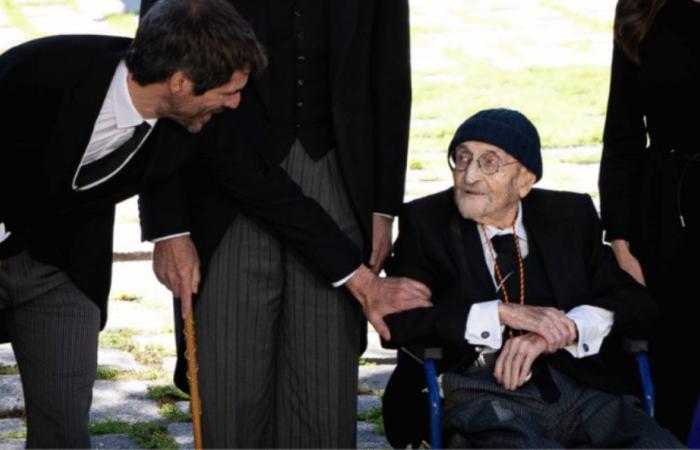The writer Álvaro Pombo has received this morning from Los Reyes the Prize for Literature in the Castilian Language ‘Miguel de Cervantes’ 2024. In the act, which has been held in the Paraninfo of the University of Alcalá, in Alcalá de Henares (Madrid), the writer and professor, Mario Crespo, in the name of the award -winning author and the Minister of Culture, Ernest Urtasun, have also intervened. Numerous personalities of politics and culture have been present at the ceremony.
The jury, gathered on November 12, awarded the prize to Álvaro Pombo for “his extraordinary creative personality, his singular lyric and his original narration. At his remote level as a poet and essayist, he joins being one of the great novelists of our language that investigates the human condition from the affective perspectives of deep and contradictory feelings.”
The ruling also points out that, in its creations, “it shows the world through the construction of a language in which the deformations of reality are reflected under the disguise of irony and humor. In its prose, orality is reflected in the will of a style that aspires to” I write as I speak “Valdesiano. Álvaro Pombo has created what defines the great writers, a literary world of my own literary essential that it touches and conduele. ”
Cervantes AwardLine jump
The Cervantes Prize was awarded for the first time in 1976 to Jorge Guillén and since then there have been 48 the award -winning authors. In 1979, the prize was awarded Ex Aequo to Jorge Luis Borges and Gerardo Diego. Since then, the call order contemplates that the award cannot be divided, declared deserted or granted posthumously.
Through the granting of this award, endowed with 125,000 euros, public testimony of admiration is given to the figure of a writer who, with the whole of his work, has contributed to enriching the Hispanic literary legacy.
An author whose literary work is totally written, or in an essential part, in Spanish. Prize candidates can present the academies of the Spanish language, the authors awarded in previous calls, the institutions that, by their nature, purposes or content, are linked to literature in the Castilian language and the members of the jury.
Álvaro PomboLine jump
-Álvaro Pombo García de los Ríos was born in Santander in 1939. He has a degree in Philosophy and Letters from the Complutense University of Madrid and Bachelor of Arts in Philosophy from the Birkbeck College in London. He has been a member of the Royal Spanish Academy of Language since 2004.
The author has extensive career, with almost half a century of publications, including novels, stories, articles in the press, essays and poetic books.
His works include, among others, ‘protocols’ (1973), ‘Variations’ (1977), ‘Stories about the lack of substance’ (1977), ‘El Simmores’ (1979), ‘Towards a poetic constitution of the current year’ (1977), ‘The hero of the mansardas of Mansard’ (1983), ‘The Adoptive Son’ (1984), ‘The insignificant crimes’ Iridized Platinum Metro ‘(1990),’ Protocols for a rehabilitation of the sky ‘(1992),’ Appearance of the Eternal female told by SM El Rey ‘(1993),’ Where women ‘(1996),’ Life of San Francisco de Asís. A paraphrasis’ (1996), ‘Recycled Tales’ (1997),’ The quadrature of the circle ‘(1999),’ El Cielo Raso ‘(2001),’ A window to the north ‘(2004),’ The fortune of Matilda Turpin ‘(2006),’ The prior death of the lieutenant aloof ‘(2009),’ The Great World ‘(2015),’ The house of the clock ‘(2016) Viscount in winter ‘(2018),’ The fate of a common cat ‘(2020),’ Supreme fiction. An assault on the idea of God ‘(2022) and’ The exclaustrated ‘(2024).
He has received different awards and distinctions such as the XIII Francisco Umbral Foundation Award for the Best Book of 2023, the XXXV International Award Menéndez Pelay Salambó Award, for ‘Against Natura’ in 2006, a work for which he also received the Ciudad de Barcelona Award in 2005, the Journalism Award ‘El Correo’, for its article ‘Unreal trip to Bilbao’ in 2006, the journalistic prize on reading awarded by the Germán Sánchez Ruipérez Foundation, for its article ‘New Books and Renewal of April’ in 2004, the FASTENRETH Award, for ‘The Circle of the Circle’ Year in which the José Manuel Lara Foundation Award was awarded, for ‘El Cielo Raso’, the Ciudad de Barcelona Award and the National Narrative Prize, for ‘Where Women’ in 1997, the Critics Award, for ‘The Iridized Platinum Metro’ in 1991, the Herralde Award, for ‘The Hero of the Mansardas de Mansard’ in 1983 and the Poetry Poetry Award El Bardo, for ‘Variations’ in 1977.
JuryLine jump
The jury, gathered on November 12, was chaired by Luis Mateo Díez, author awarded with the Cervantes 2023 and María José Gálvez, general director of the book, comic and reading of the Ministry of Culture, acted as vice president.
In addition, the jury was formed by the vowels Carme Riera, by the Royal Spanish Academy; Rosa Betty Muñoz, on behalf of the Royal Chilean Academy of Language; Jaime Garau, by the Conference of Rectors of the Spanish Universities (CRUE); Cuauhtémoc Pérez, by the Union of Universities of Latin America and the Caribbean (Udualc); Luisa Castro, by the Cervantes Institute; Ángeles García, by the Federation of Associations of Journalists of Spain (FAPE); Benjamín Torres, by the Latin American Federation of Journalists (FELAP); Minni Swahney, by the International Association of Hispanics; Marta Sanz Pastor, by the Ministry of Culture; and Rafael Cadenas, a writer awarded in the 2022 edition.
Historical of Awarded Authors
- 1976 Jorge Guillén
- 1977 Alejo Carpentier
- 1978 Dámaso Alonso
- 1979 Jorge Luis Borges / Gerardo Diego
- 1980 Juan Carlos Onetti
- 1981 Octavio Paz
- 1982 Luis Rosales
- 1983 Rafael Alberti
- 1984 Ernesto Sábato
- 1985 Gonzalo Torrente Ballester
- 1986 Antonio Buero Vallejo
- 1987 Carlos Fuentes
- 1988 María Zambrano
- 1989 Augusto Roa Bastos
- 1990 Adolfo Bioy Casares
- 1991 Francisco Ayala
- 1992 Dulce María Loynaz
- 1993 Miguel Delibes
- 1994 Mario Vargas Llosa
- 1995 Camilo José Cela
- 1996 José García Nieto
- 1997 Guillermo Cabrera Infante
- 1998 José Hierro
- 1999 Jorge Edwards
- 2000 Francisco Umbral
- 2001 Álvaro Mutis
- 2002 José Jiménez Lozano
- 2003 Gonzalo Rojas
- 2004 Rafael Sánchez Ferlosio
- 2005 Sergio Pitol
- 2006 Antonio Gamoneda
- 2007 Juan Gelman
- 2008 Juan Marsé
- 2009 José Emilio Pacheco
- 2010 Ana María Matute
- 2011 Nicanor Parra
- 2012 José Manuel Caballero Bonald
- 2013 Elena Poniatowska
- 2014 Juan Goytisolo
- 2015 Fernando del Paso
- 2016 Eduardo Mendoza
- 2017 Sergio Ramírez
- 2018 Ida Vitale
- 2019 Joan Margarit
- 2020 Francisco Brines
- 2021 Cristina Peri Rossi
- 2022 Rafael Cadenas
- 2023 Luis Mateo Díez
- 2024 Álvaro Pombo






